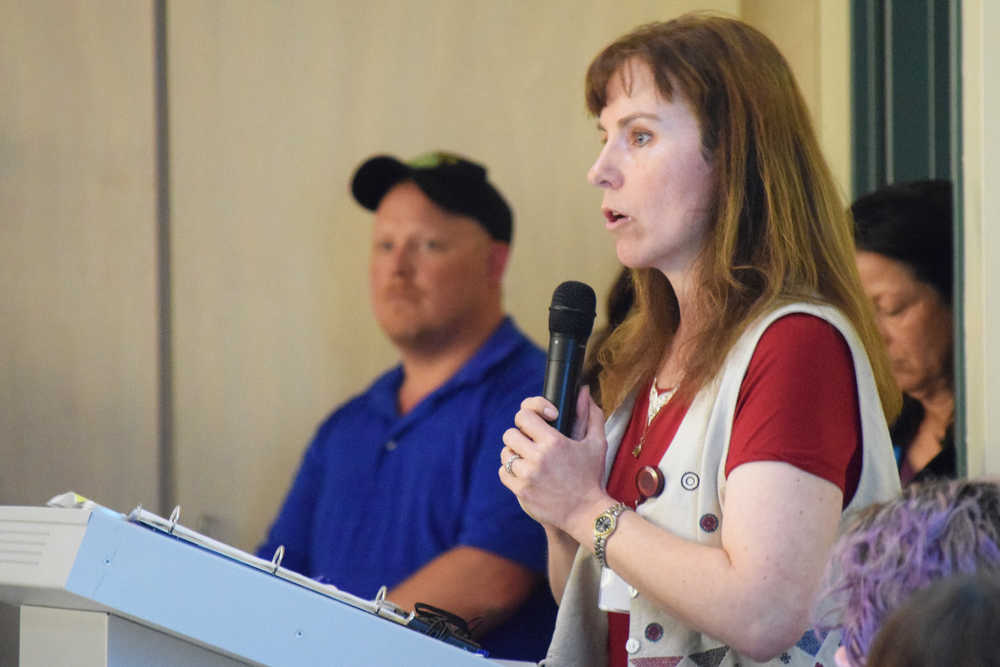Everyone crammed into a room at the Challenger Learning Center of Alaska on Thursday agreed that heroin abuse is a real, growing problem on the Kenai Peninsula. What they still have to figure out is how to beat it.
Held by the Change 4 the Kenai Coalition, the town hall called Heroin Epidemic on the Kenai drew about 170 concerned community members to the center, leaving several standing against the walls throughout the two-hour meeting. Led by Coalition Coordinator Shari Conner, it served as an introduction to the topic and a probing meeting to uncover what residents know and feel about the issue with heroin in the area.
Attendees, who ranged from concerned residents and coalition volunteers to representatives of local government and law, first participated in a survey, the results of which were displayed for all to see. Overwhelmingly, those at the town hall favored treatment over incarceration for heroin users, with 97 percent answering that they preferred the former, and only 3 percent saying they preferred the latter. When polled to see how many people at the meeting knew someone who uses heroin, 76 percent answered that they do.
“I think when we have those numbers of people that … know people that are using in one room, that’s when you see that there’s obviously a problem in our community,” Conner said.
The coalition of about 64 members and agencies began doing research about a year and a half ago, Conner said.
By hosting two town hall meetings, the group hopes to both rally concerned residents who can commit to helping and brainstorm solutions to the abuse problem that can be implemented at the community level.
“While we’re (not likely) to do anything about the supply, of keeping heroin out of our community and out of our state and out of our nation, we are able to do something about the demand,” Conner said. “If we have less demand for heroin that means we have less users.”
The coalition presented several panelists Thursday from the criminal justice, family services and health care sectors who each spoke to how heroin abuse is addressed in their field. Ruben Foster, probation supervisor for the Kenai Probation Office, presented a timeline of how heroin use has risen while abuse of other drugs has diminished over the years.
Even though the spike in heroin abuse is alarming, Foster cautioned that it is often seen accompanied by multiple other drugs, making the danger to users even greater.
“The thing about heroin use is a lot of time what we find — and I’ve been looking at this for 17 years — is it’s not just heroin,” he said. “It’s almost always heroin and meth, and weed, or, you know, meth is always for some reason in there.”
Foster and other panelists emphasized that the corrections sector often sees drug users at their worst, and that while the issue doesn’t originate in corrections, it is often up to people in that field to deal with the fall out and try to help people get back on the straight and narrow.
“I’ve watched people die. I’ve watched moms not be moms, I’ve watched dads not be dads,” Foster said. “I’ve watched kids go to OCS because the drug just doesn’t care. … I’m encouraged because I see a lot of people … that we’ve had the opportunity to come across their path at one point or another, but I also see successes in here, and we don’t often get to see that.”
Kathy Calloway of the Office of Childrens Services detailed how heroin abuse affects the family structure and weighs on both children who are taken out of homes and the parents who are no longer fit to cope with raising them.
Kristie Sellers, director of behavioral health at Central Peninsula Hospital, emphasized the importance of those who are in recovery from drug abuse living their lives openly and setting a good example for those who would like to follow in their footsteps.
Near the end of the meeting, attendees were encouraged to brainstorm solutions until they come back together to hash them out. The Change 4 the Kenai coalition also meets at 10 a.m. the third Friday of each month.
“I hope that we have something that we can do as a community that can help us address the problem and understand that corrections can’t fix the problem,” Foster said. “It’s always been a community problem. It’s never been a corrections problem, but what we can do is work with the community to try to help the problem.”
The next coalition town hall will be held at 6 p.m. Thursday at the center. Find more information at change4kenai.org.

